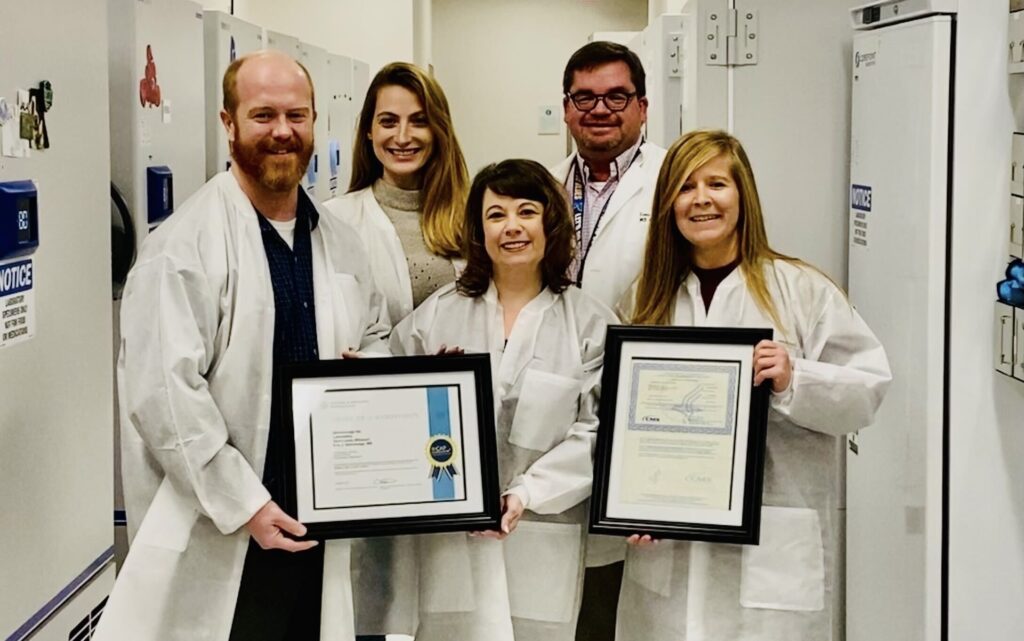Adds CAP Accreditation to Clinical Laboratory Improvement Amendments (CLIA) certification

ST. LOUIS, Dec. 14, 2022 / — Geneoscopy, Inc., a life sciences company focused on developing diagnostic tests for gastrointestinal health, today announced that the Accreditation Committee of the College of American Pathologists (CAP) has accredited the Company’s clinical laboratory facility at its headquarters in St. Louis. This achievement follows a recent on-site inspection as part of the CAP Laboratory Accreditation Program.
“This is a major milestone reflective of Geneoscopy’s commitment to laboratory excellence, safety, and quality, and driven by our dedicated team,” said Eric Duncavage, M.D., Medical Director for Geneoscopy. “Geneoscopy is now CAP-accredited, as well as Clinical Laboratory Improvement Amendments (CLIA) certified, demonstrating that our laboratory processes meet the rigorous standards for clinical testing and ensure that patients receive the highest quality results.”
The CAP Laboratory Accreditation Program was started in the early 1960s and is recognized by the U.S. federal government as being equal to or more stringent than its inspection program. During CAP accreditation, inspectors examine the laboratory’s records and quality control procedures for the preceding two years. CAP inspectors also examine laboratory staff qualifications, equipment, facilities, safety program, and associated documents. CAP accreditation is awarded to facilities that meet the highest quality standards.
Once achieved, on-site inspections occur every two years to assess ongoing compliance with the CAP accreditation program requirements. The CAP Laboratory Accreditation Program is the gold standard for laboratory excellence and fosters an environment for continuous improvement and patient safety.
Geneoscopy earned Clinical Laboratory Improvement Amendments (CLIA) Certification earlier this year. CLIA certification confirms that Geneoscopy’s clinical laboratory meets the federal regulations for clinical diagnostic testing, ensuring high quality and safety for patient testing. As part of the certification process, Geneoscopy completed analytical and clinical validation evaluating the accuracy and reliability of its patented colorectal cancer diagnostics platform.
“Delivering accuracy and consistency is imperative to us to ensure our healthcare providers and patients can rely on our testing capabilities,” said Erica Barnell, Ph.D., Chief Science Officer and co-founder of Geneoscopy. “These clinical accreditations represent exceptional standards in care and laboratory excellence, and that is why we’re so proud of our team that performs at these levels.”
About Colorectal Cancer & Screening
Responsible for over 52,000 deaths annually, colorectal cancer (CRC) is the second leading cause of cancer death in the United States, according to the American Cancer Society. CRC usually begins as a growth (or polyp) that develops into cancer over time. Thus, early detection and treatment are crucial to improving survival. Colonoscopy remains the gold standard for CRC screening in the U.S. Yet this method is frequently met with patient aversion due to its required bowel preparation, sedation, and potential time away from work, resulting in low patient compliance. Current noninvasive screening methods demonstrate lower sensitivity to detect early-stage CRC and high-risk precancerous lesions, including advanced adenomas, which are estimated to be a precursor in 95 percent of CRC cases.[1]
About Geneoscopy Inc.
Geneoscopy Inc. is a life sciences company focused on developing diagnostic tests for gastrointestinal health. Geneoscopy’s lead assay uses stool-derived eukaryotic RNA (seRNA) to detect colorectal cancer and precancerous adenomas. The U.S. FDA awarded this device its Breakthrough Device Designation for its ability to reduce morbidity associated with colorectal cancer through advanced adenoma detection. Indicative of its breakthrough status, initial trials suggest that the test can detect these precancerous lesions at a higher rate than that demonstrated by all existing noninvasive screening tests in their respective studies. Visit geneoscopy.com to learn more.
Geneoscopy Inc. Forward-Looking Statements
This release includes information about Geneoscopy’s plans concerning its noninvasive molecular test that can detect colorectal cancer and precancerous adenomas and constitute forward-looking statements. These forward-looking statements are based on the Company’s reasonable estimates of future results or trends. Because forward-looking statements relate to the future, they are subject to inherent uncertainties, risks and changes in circumstances that are difficult to predict, many of which are outside the Company’s control. Geneoscopy’s actual results and financial condition may differ materially from those indicated in the forward-looking statements. Although the Company believes that its business plans and objectives reflected in or suggested by these forward-looking statements are reasonable, such plans or objectives may not be achieved, and the actual results may differ substantially from the projected results.
About the College of American Pathologists
As the world’s largest organization of board-certified pathologists and a leading provider of laboratory accreditation and proficiency testing programs, the College of American Pathologists (CAP) serves patients, pathologists, and the public by fostering and advocating excellence in the practice of pathology and laboratory medicine worldwide. For more information, read the CAP Annual Report at cap.org.
Clinical Laboratory Improvement Amendments (CLIA) Certification
The Clinical Laboratory Improvement Amendments (CLIA) regulate laboratory testing and require clinical laboratories to be certified by the Center for Medicare and Medicaid Services (CMS) before they can accept human samples for diagnostic testing. Under the U.S. Department of Health and Human Services Centers for Medicare and Medicaid Services provisions, the Missouri Department of Public Health granted Geneoscopy initial registration for high complexity testing through the CLIA Certification Program and follows Missouri State laboratory licensure.
[1] Lin JS, Piper MA, Perdue LA, et al. Screening for Colorectal Cancer: A Systematic Review for the U.S. Preventive Services Task Force [Internet]. Rockville (M.D.): Agency for Healthcare Research and Quality (U.S.); 2016 Jun. (Evidence Syntheses, No. 135.) 1, Introduction. Available from: https://www.ncbi.nlm.nih.gov/books/NBK373586/A
